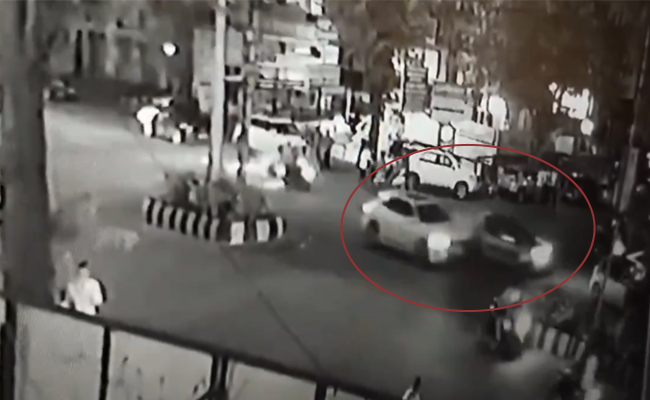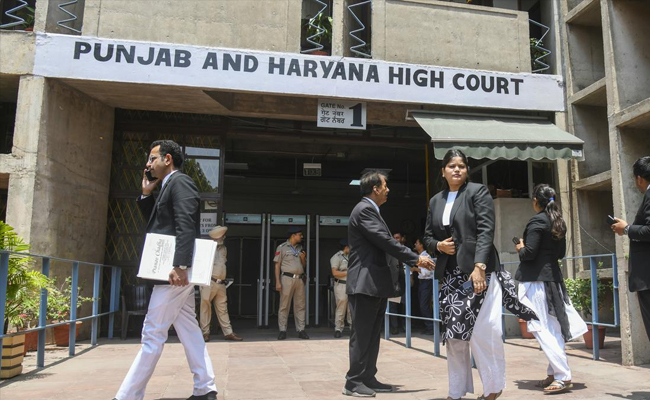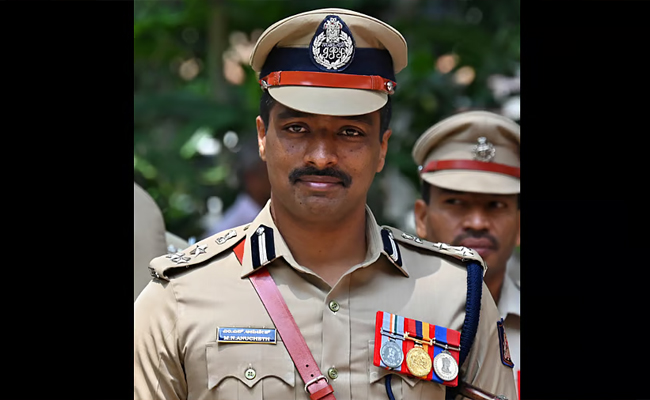Nagpur (PTI): A luxury car owned by Maharashtra BJP chief Chandrashekhar Bawankule's son Sanket hit several vehicles in the early hours of Monday in Ramdaspeth area of Nagpur, after which the driver and one more occupant were detained and their medical examination was underway, a police official said.
According to the Sitabuldi police station official, the Audi car first collided with complainant Jitendra Sonkamble's car at 1am and then with a moped, leaving two youth riding it injured.
"The Audi car struck some more vehicles moving towards Mankapur area. At T-Point there, the vehicle hit a Polo car. Its occupants chased the Audi and stopped it near Mankapur bridge. Two occupants, identified as driver Arjun Hawre and Ronit Chittamwar, were stopped by those in the Polo car," he said.
"The duo was taken to Tehsil police station, from where they were handed over for further probe to Sitabuldi police. The medical examination of driver Arjun Hawre and occupant Chittamwar is in progress. Driver Hawre could be placed under arrest at any time ," he said.
The official said the occupants of the Audi were returning from a beer bar in Dharampeth when the incident took place, adding the medical examination will include blood tests for alcohol detection.
"A case of rash driving and other offences was registered on the complaint of Sonkamble. No action has been taken so far against Sanket Bawankule and the other two occupants who reportedly escaped from the scene at Mankapur bridge," the official said.
"We are checking the CCTV footage to ascertain the chain of events, after which further action on all aspects, including other occupants, will follow," he said.
Speaking to reporters about the incident, Maharashtra BJP chief Chandrashekhar Bawankule admitted the Audi car was registered in the name of his son Sanket.
"Police should conduct a thorough and impartial investigation into the accident without any bias. Those found guilty should be charged and appropriate action should be taken against them. I have not spoken to any police official. The law must be equal for all," the senior BJP leader said.
Maharashtra BJP chief Chandrashekhar Bawankule’s son Sanket’s Audi hits several vehicles in Nagpur. There were a total of five persons in the car including Sanket Bawankule at the time of the accident. Three occupants, including Sanket Bawankule, fled. pic.twitter.com/ra0rleVOWx
— Mohammed Zubair (@zoo_bear) September 10, 2024
Let the Truth be known. If you read VB and like VB, please be a VB Supporter and Help us deliver the Truth to one and all.
Chandigarh (PTI): The cow is a pious animal and "certain acts" can severely impact peace when they offend beliefs of a "significant population group", the Punjab and Haryana High Court has said while dismissing the anticipatory bail given to a Nuh resident accused of transporting cows for slaughter.
Asif was booked along with two others in April this year under the Haryana Gauvansh Sanrakshan and Gausamvardhan Act, 2015, and the Prevention of Cruelty Act, 1960, for allegedly transporting cows to Rajasthan for slaughter.
"The present offence, apart from its legal implications, is laden with emotional and cultural undertones, given the unique status of the cow in Indian society," Justice Sandeep Moudgil said in an order earlier this month. It was made public on Monday.
"This court cannot remain oblivious to the fact that in a pluralistic society like ours, certain acts, while otherwise private, can have severe repercussions on public peace when they offend the deeply held beliefs of a significant population group," the court said.
The cow is not only a pious animal but also an integral part of India's agrarian economy, the judge said.
According to the state counsel, the petitioner was actively involved in the alleged offence of cow slaughter. Therefore, his custodial interrogation was imperative for a fair and effective investigation, he submitted.
The court said the Constitution does not merely protect rights in abstraction but seeks to build a just, compassionate, and cohesive society.
"Article 51A(g) Constitution of India enjoins every citizen to show compassion to all living creatures. It is in this context that the alleged act of cow slaughter committed repeatedly, deliberately, and provocatively strikes at the core of constitutional morality and social order," said the order.
The court observed that the offence alleged in the present FIR deals with the allegation of slaughtering a cow in conscious defiance of existing law and in utter disregard to the sentiments of the community at large.
'It is evident from the material placed on record that the petitioner is not a first time offender. He is alleged to have previously been involved in three other FIRs pertaining to similar offences.
"In those cases, the petitioner was granted the benefit of bail as a gesture of judicial trust, which appears to have been misused, rather than respected," said the court order.
Anticipatory bail, it said, is a discretionary relief, intended to protect innocent individuals from motivated or arbitrary arrest, not to provide sanctuary to those who repeatedly violate the law with impunity.
Protection of pre-arrest bail should not be granted when the applicant has been shown to be a habitual offender or where his custodial interrogation is necessary for fair investigation, it said.
The court also cited the Supreme Court verdict in the 2005 State of Gujarat vs Mirzapur Moti Kureshi Kassab Jamat case that upheld the constitutional validity of cow slaughter prohibitory laws and recognised the constitutional directive under Article 48 of the Constitution as reflecting the moral and economic ethos of society.
While dismissing the anticipatory bail plea, Justice Moudgil also observed that the court is conscious of the need to safeguard individual liberty.
"But where such liberty is demonstrably misused, and where the petitioner's conduct is indicative of recidivism, the law must respond with firmness. The right to bail is not to be confused with the right to impunity," according to the order.
"Considering the serious nature of the allegations involving offences of moral turpitude, coupled with the fact that the petitioner is a habitual offender with a likelihood of reoffending, this court is of the opinion that no grounds are made out for grant of anticipatory bail," it said.





